| |

Publications: Renditions |
No. 80
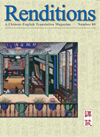
|
(Autumn 2013)
This issue is another collection of writings in various genres and from different periods of Chinese history. We are both delighted and honoured to begin it with the late Professor D. C. Lau’s translation of the ‘Advanced School of Learning’ (Daxue), that foundational Confucian text offering sage advice on self-cultivation that was a moral guide in China for many hundreds of years. Other highlights include a Song dynasty tale of elopement and the resulting court case, and seventeenth century critic Jin Shengtan’s insightful commentary on the Shuihu zhuan. Included also are ‘The History of Humanity’, an important 1907 essay by Lu Xun, a thought-provoking exploration on the differences between Chinese literature and civilization and the Western institutions by the controversial writer and critic Hu Lancheng, followed by ten contemporary poems by Chien Chengchen, and a short story from 1930s Shanghai by the ‘new sensationalist’ Mu Shiying.
Table of
contents
Order
|
No. 79
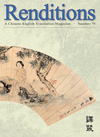
|
(Spring 2013)
The issue features a selection of work representing a variety of periods and genres of Chinese literature. Highlights include “Lament over My Poor Fate,” an extraordinary long poem of female authorship from the Song dynasty translated by Wilt Idema, a selection of Huang Zunxian’s writings on Japan, translated by Jack Chen and Yunshuang Zhang, followed by a commentary essay by Cheng Yu-yu of National Taiwan University. We will also continue our serialization of David Hull’s translation of Waverings, Mao Dun’s epic of the 1927 revolution.
Table of
contents
Order
|
Nos. 77 & 78
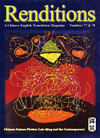
|
(Spring & Autumn 2012)
Chinese Science Fiction:
Late Qing and the Contemporary
This issue showcases representative work of Chinese science fiction from the late Qing and the contemporary. As a popular genre, science fiction has energized modern Chinese literature by evoking a whole array of sensations ranging from the grotesque to the sublime, from the Utopian to the apocalyptic, and from the human to the post-human. It mingles nationalism with fantasy, envelopes politics in scientific discourse, and delivers sharp social criticism with an acute awareness of probabilities and possibilities. Science fiction today both echoes and complicates the late Qing writers' vision of China's future and the transformation of our species and universe, and this special issue aims to contextualize a comparative reading of some important Sci fi writings from these two epochs and the similar expectations and anxieties they bring to Chinese readers.
Table of
contents
Order
|
No. 76
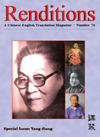
|
(Autumn 2011)
Yang Jiang
In celebration of Yang Jiang's centenary year, this special issue presents a sampling of works from Yang's eight-decade-long career, including new translations of some of her best essays and short stories, as well as excerpts from her first play (Heart's Desire, 1943), her memoirs, and her most recent book, Arriving at the Margins of Life: Answering My Own Questions (2007). Born during the year of the Republican Revolution, Yang Jiang (1911– ) went on to distinguish herself as one of modern China's most accomplished and versatile scholar-writers. Best known for her understated yet often humorous prose style, Yang is also an accomplished playwright and novelist; a prodigious translator from French, Spanish, and English; and an influential memoirist and intellectual who has come to be regarded by many as a paragon of modern Chinese humanism.
Table of
contents
Order
|
No. 75
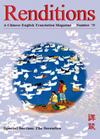
|
(Spring 2011)
Special Section: The Seventies
This issue focuses on a set of translations from the collection of reminiscences edited by Bei Dao and Li Tuo, The Seventies. A compendium of writings on their experiences of the decade that has proved so pivotal to contemporary China by a large group of writers who lived through it, the work has attracted great attention in the Chinese-speaking world. Also included is a prizewinning translation of the first three chapters of Mao Dun's Waverings, at once the second novella of the Eclipse trilogy, the author's first venture into prose fiction and a key document of the 1927 revolution.
Table of
contents
Order
|
No. 74
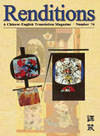
|
(Autumn 2010)
This issue begins with a Scots translation of Du Fu's 'Autumn Meditations', accompanied by an essay that reflects on the considerations in translating poetry. A deeply felt eulogy to the late modernist poet from Taiwan, Shang Qin, is written by his friend and fellow writer Wai-lim Yip. Lu Xun's essay 'Lessons from the History of Science' sheds light on the series of events that Chinese thinkers and writers were faced with at the turn of the 20th century. Other features comprise superb translations of three contemporary poets, Han Dong, Genzi, and Wann Ai-jen, an anti-war short story by Xue Yiwei, and a short essay by Bei Dao.
Table of
contents
Order
|
No. 73
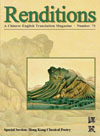
|
(Spring 2010)
Special Section: Hong Kong Classical Poetry
The fifty-page special section features the works by twenty-four local poets from the yesteryears, illustrated with historical images of Hong Kong. They portray a pastoral and historically-conscious Hong Kong before she evolved into the fast-moving cosmopolitan city known to the world today. Also included in the issue are excerpts from Yu Jian's travel writing, Liu Yichang's short story, and Li Yu's discourse on food and doctoring.
Table of
contents
Order
|
No. 72
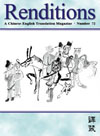
|
(Autumn 2009)
This miscellaneous issue features excerpts from Jin Yong's martial art novel The Smiling, Proud Wanderer, a short story about Japanese expatriates in Taiwan upon their WWII defeat, as well as Li Yu's exposition on the theatre. Also included in the issue are selections of poems by Liu Yong and the Tang-dynasty monk, Jiaoran.
Table of
contents
Order
|
No. 71
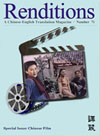
|
(Spring 2009)
Chinese Film
Extracts from Chinese film scripts and other texts from the 1930s to this century are included in this issue. They range from The New Woman (1934), starring Ruan Lingyu, to Chunmiao (1975) from the Cultural Revolution, and include a storyboard from Zhang Yimou's Hero (2001). Fei Mu's Spring in a Small Town (1948) is a highlight. The issue will explore whether the literary film script (dianying wenxue juben) is a uniquely Chinese invention, written like fiction but reflecting what we see on the screen. The more usual shooting-scripts of several titles will also be included and pages from them will help illustrate the issue.
Table of
contents
Order
|
| |
|
|
|
|
|





